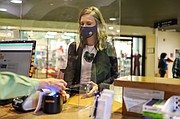It's been two years since Hamilton County reported its first COVID-19 case, and though the pandemic isn't over, concerns over the coronavirus have largely shifted to the backburner across much of the Chattanooga region - at least for the time being.
As of Friday, Hamilton County was averaging 14 new COVID-19 cases per day over the past week, and though that's likely a significant undercount because of the rise of at-home testing, it's a vast improvement from the omicron peak average of 898 new cases per day on Feb. 6.
Weekly wastewater analysis, which many public health experts say may be a better way to track case trends now that test reporting is more sporadic, also reflects a significant decline in new cases, as have COVID-19 hospitalizations.
There were 42 coronavirus patients in Hamilton County hospitals as of Friday, down from the most recent peak of 289 on Jan. 31, and the number of patients in intensive care has returned to the same low level as the early days of the pandemic.
(READ MORE: For Chattanooga hospitals, COVID-19 is the 'new normal' one year into pandemic)
Dr. Jensen Hyde, a hospitalist treating COVID-19 patients at Erlanger Medical Center who holds a master's degree in public health, said it's safe to say that the omicron surge is over, and while there's hope that it will be the last major surge of the pandemic, it's too soon to say when the coronavirus will shift from a pandemic to "endemic," meaning it occurs at a predictable rate like other seasonal viruses, such as influenza.
"Influenza is endemic. It doesn't occur at the same rates all the time, but we can more or less predict how many flu cases we're going to have a year," Hyde said, noting that there are occasionally years where flu reaches epidemic and pandemic levels. "That's likely how this will behave from year to year. I just don't know yet if we are at a point where we will continue these surges, because we just haven't been there yet."
Carissa Etienne, Pan American Health Organization director, said the coronavirus remains a threat, and counties should keep a "finger on the pulse," building on lessons from the past two years to act quickly and adjust public health guidance if a new variant emerges or cases surge again.
"We all want the pandemic to be over, but optimism alone cannot control the virus," Etienne said in a news release. "COVID-19 is likely to be here to stay. We must learn to live with this virus, and quickly adapt to new changes."
But in the Chattanooga region, where many residents have either grown weary of or hostile toward mitigation efforts, it's unlikely that any public health measures would be reenacted.
(READ MORE: Hamilton County stood ground on mask mandate for 10 months despite political backlash)
Hyde advises that residents continue to monitor case trends and adjust their behavior accordingly if needed, including wearing a mask in public places - particularly when indoors - and prioritizing outdoor activities when the weather allows and avoiding high-risk activities.
Vaccination should also continue to be a priority. Although vaccine efficacy for symptomatic illness declined with omicron, Hyde said protection against severe hospitalizations, death and long COVID remain high.
"In my house, that's what I care about. My kids get colds all the time. I'm not worried about that. But we know that COVID doesn't act like a cold - it doesn't even act like the flu," she said. "You have people who have years, at this point, of long COVID symptoms, and people who develop severe illness and die.
"So if you're doing everything you can do to protect against that and adjusting your activities based on community transmission, those are a really powerful set of tools that we have as individuals," Hyde said.
Contact Elizabeth Fite at efite@timesfreepress.com or 423-757-6673. Follow her on Twitter @ecfite.

